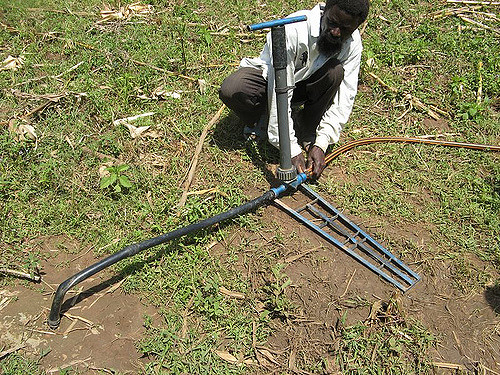Overview
Researchers
Sylvain Chassang
Professor of Arts and Science at New York University
Pascaline Dupas
Professor of Economics at Stanford University
Catlan Reardon
Erik Snowberg
Professor of Economics and Political Science at California Institute of Technology and Faculty Research Fellow in the Political Economy Group for the National Bureau of Economic Research
- Country
- Kenya
- Timeline
- 06/01/2013 - 12/31/2016
- Previously Funded Stages
- Pilot
- Constraints
- Information
- Technology Category
- Inputs
- Sample
- Approximately 4,000 participants in 200 villages in Busia and Bungoma counties

Kickstart hip pump. Photo credit: Lukas Bergstrom via Flickr
Farmers may vary in their suitability as experimenters with new agricultural technologies. For example, farmers likely differ in their beliefs regarding the possible returns of the technology, in their willingness to take risks with an unknown product or process, and in their social skills and willingness to share information with others. Researchers are investigating how important these differences are when it comes to increasing the use of irrigation pumps in western Kenya, and whether subsidies for experimentation can be targeted based on certain skills or traits to more effectively increase technology adoption.
Policy Issue
Local experimentation is believed to be a necessary condition for smallholder farmers to learn about the potential benefits and costs of a new agricultural technology. Governments and development organizations often indirectly subsidize experimentation through extension workers, whose demonstrations can at times substitute for local experimentation. Another option is to directly subsidize experimentation either by providing discounts on technologies to a few farmers per village. Little evidence exists, however, as to whether farmers vary in their suitability as experimenters. That is, farmers likely differ in their beliefs regarding the possible returns of the technology, in their willingness to take risks with an unknown product or process, and in their social skills and willingness to share information with others. Researchers are investigating how important these differences are when it comes to spreading the use of new technologies, and whether subsidies for experimentation can be targeted based on certain skills or traits to more effectively increase technology adoption.
Context of the Evaluation
This study takes place in Busia and Bungoma counties in rural western Kenya, among small-scale farmers who farm on plots 20 meters or less from a water source. Even during long dry spells, there is low adoption of efficient irrigation technologies among these farmers. Many farmers use bucket irrigation carrying buckets of water from a well, river, or other water source to their fields which is extremely time-consuming and limits the area that can be irrigated. In Busia, only 3 percent of farmers in the study sample were using a manual pump when the study began, and none had a motorized pump.
Details of the Intervention
Researchers are conducting a randomized evaluation to study experimentation with and adoption of small-scale irrigation pumps among smallholder farmers in western Kenya. This study aims to determine if significant differences exist across farmers in experimental skills; if these skills are known to farmers and/or to their neighbors; if information about these skills can be elicited; if targeting based on experimental skills promotes information creation and diffusion; and whether better information diffusion leads to faster spread of technology.
A total of 200 villages, each with 20-25 farmers, are randomly assigned to one of four treatment arms. In the comparison arm, farmers that receive an irrigation pump are selected through a standard lottery with equal odds. The three treatment arms are “selective trials”-where the odds of receiving the pump increase with a participant’s likely experimental skills-designed to elicit participants’ tendency to experiment with the technology. The willingness to experiment (WTE) cash arm is based on whether farmers are willing to pay for additional lottery tickets that yield a higher chance of winning the free pump in either cash or grain. The WTE task arm helps alleviate immediate cash constraints household face by offering additional lottery tickets to farmers willing to work an additional four hours to increase their likelihood of winning the free pump. In the last arm farmers receive the pump based on how many votes farmers receive from their neighbors when their neighbors are asked to vote for the best experimenter.
There are two main sets of outcomes of interest: (1) impact of the pump on yields and income, and (2) adoption of the pump across neighbors over time. Researchers will examine the impact across the different treatment arms to determine which willingness to experiment or targeting mechanism was most effective. Knowledge of how to use the pump and beliefs about the returns to using a pump will also be measured for all farmers.
Results and Policy Lessons
Project ongoing, results forthcoming.